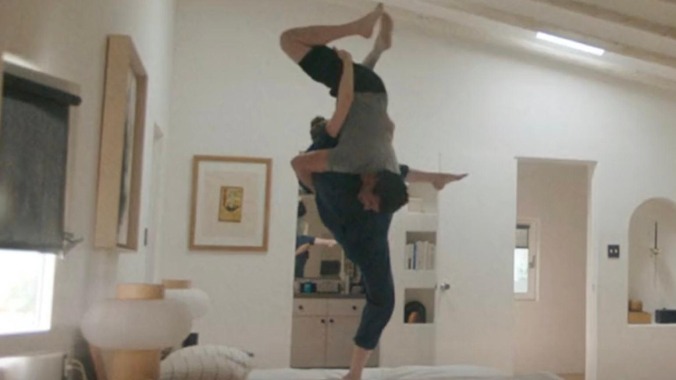How are we still processing The Curse finale?
Season one of the Showtime satire ended more than two weeks ago, but we've yet to come to terms with its nightmarish, surreal sendoff

The Curse is gone; long live The Curse. And thanks to the series’ unforgettable ending, it probably will—at least in our minds. As a goodbye present, Showtime’s drama delivered 2024’s first truly petrifying episode of TV with its season-one finale, which dropped on January 14. “Green Queen” leaves a haunting memory in its wake as a WTF-inducing hour of television, which is simultaneously delirious, shocking, and darkly comical. How often do you look at the screen and go, “He what? He clung to a tree branch that was chopped off, thus ejecting him into the goddamn orbit?” How are we expected to process that? It’s exactly the kind of episode that takes up space in your brain long after it’s over. But we’re getting ahead of ourselves.
The first big moment during the finale that made us do a double-take came halfway through the hour. A pregnant Whitney (Emma Stone) wakes up one morning to see her husband, Asher (Nathan Fielder), floating overhead. He’s fast asleep but not next to her in bed. Instead, he’s on the ceiling. The camera slowly, deliberately tilts to him for the reveal. It’s so abrupt and creepy that we had no choice but to rewind and rewatch it twice to ensure we didn’t miss a pivotal explanation for Asher’s ascension. And then we kept watching, realizing with a gnawing sense of horror with each passing minute, asking ourselves if, holy hell, the curse might actually be real.
For its entire first season, the show has been building up to this moment. Yet no amount of cringe or shock value could’ve prepared us for The Curse’s abstract unfolding in its last 30 minutes. Series co-creators and co-stars Benny Safdie and Fielder have aimed for a trippy narrative here—and a divisive one. They likely knew going in that “Green Queen” wouldn’t—and probably didn’t—land well for everyone. It’s too bizarre, with subplots left untied. But it turns out that satirizing white liberalism is a good springboard to (insanely) tackle a surprisingly touching theme.
See, The Curse is a nightmare-inducing examination of commitment—to a person, a career, and even your own belief of who you are. It unpacks the mental toll of what staunch devotion does to you. Whitney knows in her heart she isn’t the giving person she pretends to be, no matter how hard she tries. Her commitment to this notion leads to plenty of selfish behavior. She’s committed to staying with a spouse she despises to feel better about herself, among other reasons. And poor Asher. He’s equally committed to his marriage, unsure of what life without it will be.




















![HBO teases new Euphoria, Larry David, and much more in 2026 sizzle reel [Updated]](https://img.pastemagazine.com/wp-content/avuploads/2025/12/12100344/MixCollage-12-Dec-2025-09-56-AM-9137.jpg)



















